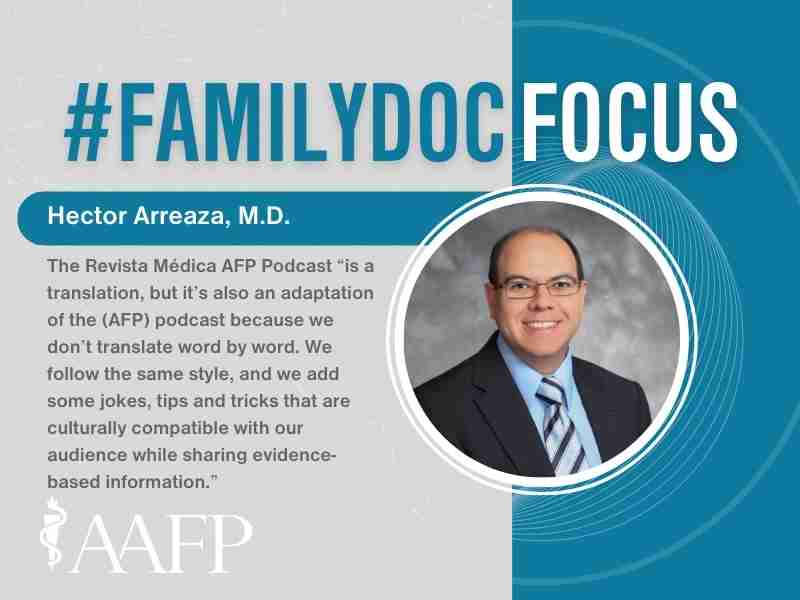FP Innovator’s Vision Brings AFP Content to New Audience
May 18, 2023, David Mitchell — Hector Arreaza, M.D., was such a fan of the AFP Podcast that he spent more than a year working to bring bi-weekly summaries of American Family Physician’s content to a brand-new audience.

In the summer of 2021, Arreaza pitched the idea of a Spanish-language version of the podcast to University of Arizona College of Medicine - Phoenix Family Medicine Residency program director Steve Brown, M.D., who summarizes the content of the journal twice a month with residents and faculty in the popular AFP Podcast.
“We came up with the idea after listening to the AFP Podcast for many years,” said Arreaza, associate program director of the Rio Bravo Family Medicine Residency Program in Bakersfield, Calif. “Our residents learn a lot from the podcast because it is fresh, entertaining, clinically relevant and easy to follow.”
The original award-winning AFP podcast has been downloaded nearly 7 million times since its launch in 2015. It averages roughly 45,000 downloads for each new episode, which includes discussions of the key evidence-based learning points from each issue of the journal, short summaries of its articles and features, interviews with family physicians and more.
After many meetings and lots of planning, Revista Médica AFP Podcast, launched in February 2023 and has been downloaded more than 3,400 times. The Spanish-language podcast is produced in partnership with the Rio Bravo program and Clinica Sierra Vista in Bakersfield.
“It’s a translation, but it’s also an adaptation of the podcast because we don’t translate word by word,” Arreaza said. “We follow the same style, and we add some jokes, tips and tricks that are culturally compatible with our audience while sharing evidence-based information.”
Arreaza hopes the new podcast will be a learning tool for his residents and that it will accelerate the dissemination of evidence-based information from the AAFP’s peer-reviewed journal to Spanish-speaking physicians in other countries.
“The idea came to me when I was listening to the AFP Podcast because I thought, ‘I wish my colleagues in Venezuela knew this,’” he said, “‘but I know they’re not going to get this information for months or even years.’”
Rio Bravo has 24 residents, including several who are native Spanish speakers. Arreaza said the new podcast allows those native speakers to express themselves in their own language.
“I’ve been speaking English for 20 years, and I consider myself fluent,” he said, “but English is still a foreign language for me. If I were doing this interview with you in Spanish, I would be more eloquent; I sound smarter in Spanish. We have residents who are brilliant, and they shine in any language but express themselves much better in their native language.”
Arreaza has been using podcasts as a learning tool for three years. During a Society of Teachers of Family Medicine conference, he attended a session that challenged participants to think about unique new ways to teach residents and medical students. He did his homework, got support (and funding for equipment) from his program, and the Rio Bravo qWeek Podcast was born.
Arreaza, who also is a clerkship director, produces this 15 to 20-minute English-language podcast each week with students, residents and faculty, who review topics they have discussed recently.
“I work with medical students, too,” he said. “I require them to teach something during their rotation. It can be in a podcast or in a conference room, and many of them choose the podcast. We write the topic, we read it together and then we record it. It’s an exercise to get some knowledge in your brain by repeating it many times. Repetition is the mother of learning.”
Arreaza can relate well to international students and residents. He first came to the United States in 2003 as a Mormon missionary, working in Salt Lake City for two years after completing medical school in Venezuela. A few months after returning to his home country, he decided to pursue residency training in the United States but found limited opportunities in Utah.
He eventually turned to UCLA’s International Medical Graduate Program, which helps IMGs pass U.S. licensing exams and match in family medicine programs.
Latinos are California’s largest ethnic group, accounting for roughly 40% of the state’s residents. In some areas, like Los Angeles County, Latinos account for roughly half the population. However, only 5% of California’s physicians are Latinos, and only about 25% of the state’s physicians speak Spanish.
“UCLA is trying to close that gap, because many patients can’t speak English,” said Arreaza, who spent a year in the UCLA program before matching at Rio Bravo. “They had the brilliant idea to minimize brain waste among doctors who are already in the U.S. working in non-physician jobs and help them find residency spots in California. That’s what I did.”
In its first 10 years, UCLA’s IMG Program helped 116 bilingual, bicultural physicians match into family medicine residencies. Participants commit to serving in the state’s medically underserved communities for two to three years after completing their training.
Arreaza had planned to eventually return to Utah, but six years after graduation he is still in the Golden State and teaching at the same residency where he trained. Rio Bravo had six residents when Arreaza joined its first class in 2014. The program has since expanded to eight residents per class and has plans to expand again.
“I want to support the mission of this organization and help build this program,” Arreaza said. “It is really needed, because the whole Central Valley is medically underserved and we need more doctors here. Instead of importing doctors, this organization decided to train its own with the hope that many of them will stay here in the Central Valley, which is happening.”